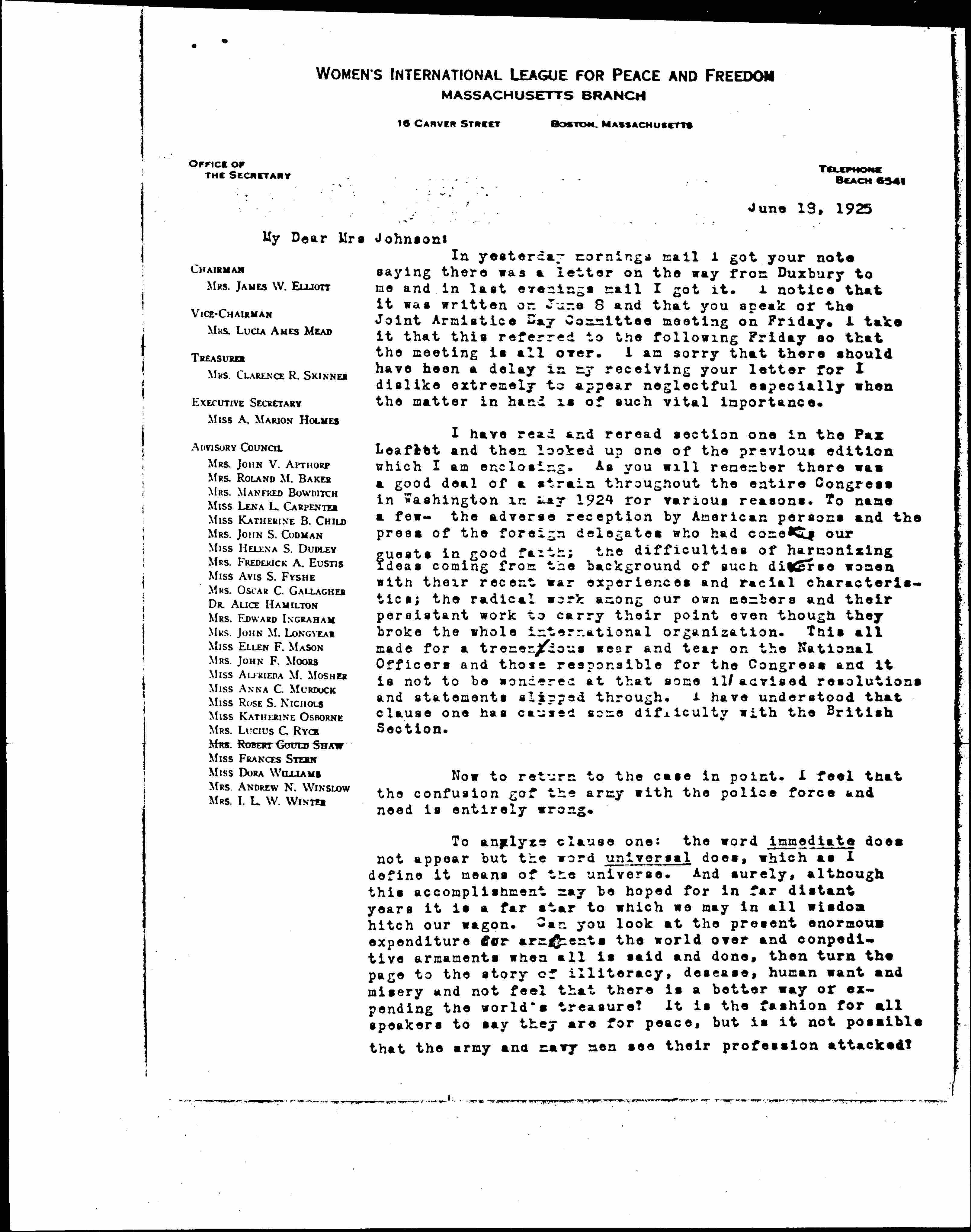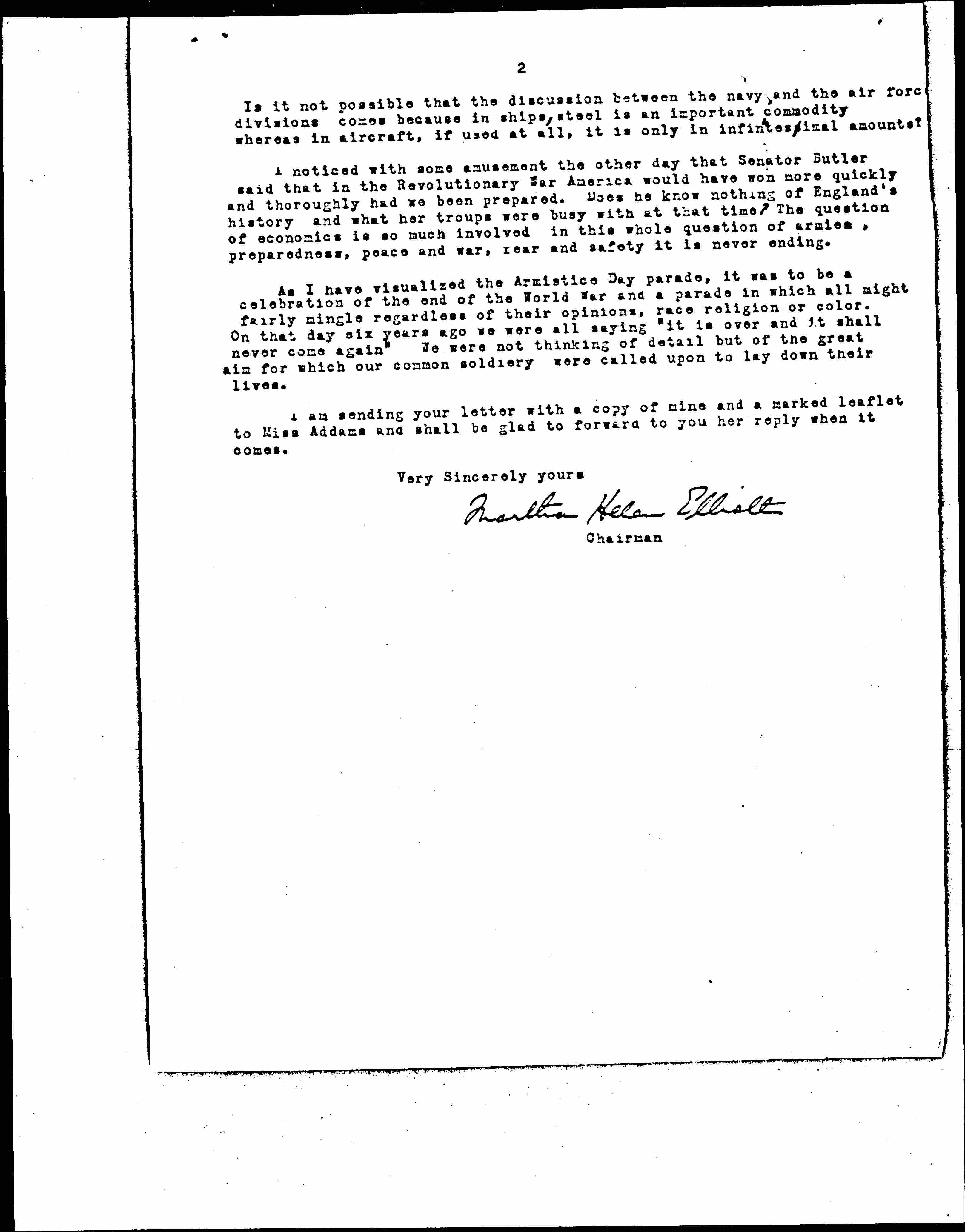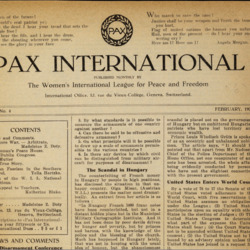June 18, 1925
My Dear Mrs Johnson:
In yesterday mornings mail I got your note saying there was a letter on the way from Duxbury to me and in last evenings mail I got it. I notice that it was written on June 8 and that you speak of the Joint Armistice Day Committee meeting on Friday. I take it that this referred to the following Friday so that the meeting is all over. I am sorry that there should have been a delay in my receiving your letter for I dislike extremely to appear neglectful especially when the matter in hand is of such vital importance.
I have read and reread section one in the Pax Leaflet and then looked up one of the previous edition which I am enclosing. As you will remember there was a good deal of a strain throughout the entire Congress in Washington in May 1924 for various reasons. To name a few -- the adverse reception by American persons and the press of the foreign delegates who had come [as] our guests in good faith; the difficulties of harmonizing ideas coming from the background of such diverse women with their recent war experiences and racial characteristics; the radical work among our own members and their persistent work to carry their point even though they broke the whole international organization. This all made for a tremendous wear and tear on the National Officers and those responsible for the Congress and it is not to be wondered at that some ill advised resolutions and statements slipped through. I have understood that clause one has caused some difficulty with the British Section.
Now to return to the case in point. I feel that the confusion got the army with the police force and need is entirely wrong.
To analyze clause one: the word immediate does not appear but the word universal does, which as I define it means of the universe. And surely, although this accomplishment may be hoped for in far distant years it is a far star to which we may in all wisdom hitch our wagon. Can you look at the present enormous expenditure for armaments the world over and [competitive?] armaments when all is said and done, then turn the page to the story of illiteracy, [disease], human want and misery and not feel that there is a better way of expending the world's treasure? It is the fashion for all speakers to say they are for peace, but is it not possible that the army and navy men see their profession attacked? [page 2] It is not possible that the discussion between the navy and the air force divisions comes because in ships, steel is an important commodity whereas in aircraft, if used at all, it is only in infinitesimal amounts?
I noticed with some amusement the other day that Senator Butler said that in the Revolutionary War America would have won more quickly and thoroughly had we been prepared. Does he know nothing of England's history and what her troops were busy with at that time? The question of economics is so much involved in this whole question of armies, preparedness, peace and war, fear and safety it is never ending.
As I have visualized the Armistice Day parade, it was to be a celebration of the end of the World War and a parade in which all might fairly mingle regardless of their opinions, race, religion or color. On that day six years ago we were all saying "it is over and it shall never come again." We were not thinking of detail but of the great aim for which our common soldiery were called upon to lay down their lives.
I am sending your letter with a copy of mine and a marked leaflet to Miss Addams and shall be glad to forward to you her reply when it comes.
Very Sincerely yours

![REEL0017_0661[1].jpg REEL0017_0661[1].jpg](https://digital.janeaddams.ramapo.edu/files/square_thumbnails/276ae5451ecac734455b4b35df551ce1.jpg)
![REEL0017_0662[1].jpg REEL0017_0662[1].jpg](https://digital.janeaddams.ramapo.edu/files/square_thumbnails/fc4f72a632c3793a8ba5d85813974469.jpg)











![REEL0017_0659[1].jpg REEL0017_0659[1].jpg](https://digital.janeaddams.ramapo.edu/files/square_thumbnails/36ef862c72ca44976f03058df127e0d0.jpg)
![REEL0017_0658[1].jpg REEL0017_0658[1].jpg](https://digital.janeaddams.ramapo.edu/files/square_thumbnails/7e0f12affd0b8208027ff5ac90b680ea.jpg)
Comments